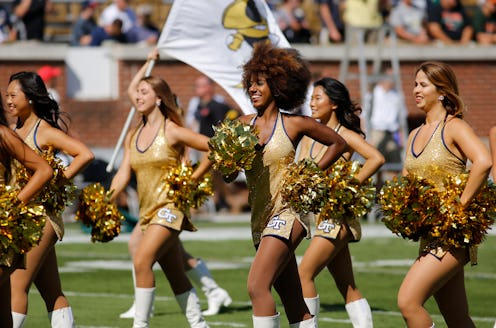
As prominent sports legends, current athletes, everyday men and women express their solidarity with African American football player Colin Kaepernick, one particular photo of a dancer is making massive rounds on Twitter. You might have seen it. Clad in a resplendent yellow uniform, with her hand behind her back, and staying resolutely on her knee, the dancer may seem out of place in terms of her team's line placement but the sentiment of the photo appears most appropriate given its context. So, who is Raianna Brown? Georgia Tech football team's dancer took a knee last year after being inspired by Kaepernick's protest.
Brown's Twitter bio says that she is a theater artistic director, engineer, choreographer, and what you get when "Ella Baker meets Katherine Dunham." Baker was a revolutionary civil rights activist while Dunham was one of America's most iconic dancers.
Although Brown took a knee last year in October, she shared the photo a day after Donald Trump indirectly called Kaepernick a "son of a b*tch" during a political rally in Huntsville, Alabama, on Friday night. Trump was originally scheduled to elaborate on his support for Sen. Luther Strange but instead went on a disturbing rant against the former 49ers player, harshly criticizing his political protest.
Brown explained her reason for taking the knee last year and said that Kaepernick's own silent protest gave her the momentum and inspiration to do the same. "[It was the] proudest and scariest moment as a yellow jacket happened at the same time. Thank you, @Kaepernick7, for inspiring [me] to #TakeAKnee to take a stand," Brown tweeted.
The young dancer was praised by many in response on Twitter. One observer, however, said that he hoped she lost her position as a cheerleader on the Georgia Tech team as well as "any scholarships you might have." "I didn't," Brown responded.
Last year in August, Kaepernick refused to stand for the American national anthem during a pre-game preparation. The football player was leading San Francisco 49ers as their quarterback. In an exclusive interview with NFL Media, Kaepernick lucidly articulated why he took a knee during that very moment.
"I am not going to stand up," Kaepernick explained, "to show pride in a flag for a country that oppresses black people and people of color. To me, this is bigger than football and it would be selfish on my part to look the other way. There are bodies in the street and people getting paid leave and getting away with murder."
Subsequently, he was lauded and criticized by various members in his own ranks, sports figures, and sports commentators. Kaepernick's protest inspired other athletes to take a knee as well. In a recent opinion-editorial published in the New York Times, fellow team member Eric Reid explained why he took a knee with Kaepernick. Reid quoted American essayist and social philosopher James Baldwin and said, "It should go without saying that I love my country and I’m proud to be an American. But, to quote James Baldwin, 'exactly for this reason, I insist on the right to criticize her perpetually.'"
In short terms, both players found documented police brutality against black Americans deeply disturbing and worth speaking out again. In fact, The Huffington Post reported that nearly 223 black Americans had been killed by the police in the year after Kaepernick's protest.
In spite of the criticism from those who didn't agree with Kaepernick's protest, his former team issued a statement right after his decision to not stand for the national anthem and supported his right to free expression.
An official statement from the San Francisco 49ers noted that: "The national anthem is and always will be a special part of the pre-game ceremony. It is an opportunity to honor our country and reflect on the great liberties we are afforded as its citizens. In respecting such American principles as freedom of religion and freedom of expression, we recognize the right of an individual to choose and participate, or not, in our celebration of the national anthem."